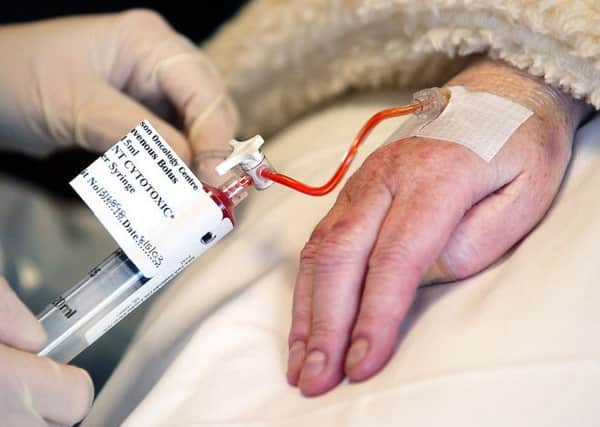Thousands of Scots live extra decade with cancer


The research also found that during the same 20-year period, 735 Scots who were diagnosed with cancer over the age of 80 went on to survive for more than ten years.
Macmillan Cancer Support said the figures showed how much life expectancy with the disease had improved, but that further progress could be made to bring the UK’s survival rates in line with other parts of Europe.
Advertisement
Hide AdAdvertisement
Hide AdThe new figures, compiled by Macmillan and the National Cancer Intelligence Network (NCIN), showed that across the UK in the last 20 years, 130,000 older people have survived for ten years after being diagnosed at 65 or over, including 8,000 over-80s.
Macmillan said it wanted to raise awareness of the numbers of older people surviving cancer after research at the end of last year found elderly people in the UK have higher mortality rates than those in other countries.
The international research showed that for many common cancers, such as prostate, breast, lung, stomach, ovary and kidney, the UK and Ireland had a lower five-year survival rate than the rest of Europe for patients of all ages. However the gap was greatest for patients over 75.
For example, while the survival rate for lung cancer in the UK and Ireland is 9 per cent worse than the European average for adults aged under 45, it stands at 44 per cent worse for those aged 75 or over.
Janice Preston, Macmillan’s general manager in Scotland, said: “It’s worrying older people in the UK have higher mortality rates than those in other countries and we need to understand why this is.
“It’s vital we ensure any potential barriers to treatment are picked up and tackled as this research shows older people can be successfully treated.”
Jim Robertson, 79, is one patient who is not taking his cancer diagnosis lying down. Two years after being diagnosed with lung cancer, he is planning to climb the Schiehallion Munro in June in aid of Macmillan.
Mr Robertson, from Perthshire, had surgery and radiotherapy after he was diagnosed, but despite this he says he feels fitter than he was before he had cancer. “I was lucky because the cancer was found early and as a result I was able to have surgery. Often lung cancer is found too late for that,” he said.
Advertisement
Hide AdAdvertisement
Hide Ad“I don’t think any older person should decide they are too old for treatment and I don’t think any health professional should take that approach, either.”
Macmillan wants the NHS to use assessment methods which take into account a patient’s overall physical and mental wellbeing so that treatment decisions are not based on age alone.
The charity also wants the Scottish Government to make sure its Detect Cancer Early programme is successfully encouraging older people to talk to their doctor if they have any worries about cancer.